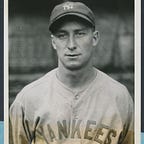Buddy The Jew . . . ?
Wednesday, September 7, 1927: Boston
 Well, it took a couple of months, but my pal Buddy Myer finally spilled the beans on why he was traded from the Senators to the Red Sox last May.
Well, it took a couple of months, but my pal Buddy Myer finally spilled the beans on why he was traded from the Senators to the Red Sox last May.
As previously noted, it was a trade that no one could figure out. Buddy’s a tough young shortstop, one of the best in either league — everyone knows he’s going to be a star in the majors for a long time — and yet he was traded two weeks into the season for Topper Rigney, a complete stiff who’s now been benched for the rest of the season by Bucky Harris, the Senators’ player-manager.
So why did Myer get traded?
That’s been one of the big mysteries of the season. No one on our team, or any of the players I’ve talked to around the league, including Myers’s old teammates, have any idea. Neither do Ford Frick or any of the other boys in the press box.
Last night, after we played another wild doubleheader against the Red Sox in Fenway, Buddy finally fessed up.
“Religion did me in.”
 It’s close to midnight, and Buddy and his teammate Red Ruffing, the Red Sox’s hard-luck pitcher, and Schoolboy Hoyt and I are damaging our livers in a blind pig a couple of blocks from our hotel.
It’s close to midnight, and Buddy and his teammate Red Ruffing, the Red Sox’s hard-luck pitcher, and Schoolboy Hoyt and I are damaging our livers in a blind pig a couple of blocks from our hotel.
“What do you mean, religion did you in?” I ask Buddy.
“Tris Speaker called me a dirty Jewboy and a k*ke. So I socked him.”
Schoolboy spills his suds laughing.
“When was this?” I ask.
“Down in Tampa, during spring training. Speaker had just come over to the team, courtesy of the Commissioner. We had all heard he was a bad guy, but we were hoping he’d help the club.”
Speaker is a bad guy. It’s strongly rumored that he’s a Klansman. It’s also widely accepted that Commissioner Landis orchestrated his move from Cleveland to Washington as part of a shell game to keep things quiet about Speaker and Ty Cobb fixing a game back in 1919.
“Anyway, it’s the last week of spring training, and we’re playing poker — Speaker, Sam Rice, Goose Goslin, Muddy Ruel, Ossie Bluege and me — and Speaker bets $20, but he only throws in a $10 chip.
“Sam says something about it, and Speaker says he’s not the one that tossed in the wrong chip. I politely tell Tris, ‘Sam’s right, you must have made a mistake.’ Hell, I saw him do it, but I tried hard not to say it in a way that would sound like I was accusing him of cheating — which he most certainly was.
“So, the prick turns to Sam and says, ‘Well, Rice, I apologize. You must be right, if the k*ke says so. After all, those boys know their dimes.’
“I told him he was out of line. He got up to leave the game, and on the way out, under his breath he called me a dirty Jewboy. So I socked him.”
“Was it a good shot?” asks Schoolboy, still laughing.
“Oh, yeah. He hit the floor. Then almost as soon as he scraped himself off it, the bastard started lobbying Griffith and Harris to trade me. Bucky didn’t want to make the trade, but then at the start of the season I made a bunch of errors being too aggressive in the field. Apparently, Tris had Griffith’s ear, and a couple of weeks later, I was gone.”
It doesn’t surprise me that Clark Griffith, the Senators’ owner, would listen to Speaker; as a ballplayer, Speaker’s right up there with Cobb, Hornsby and Ruth. And as the player-manager of the Indians for seven seasons before going over to the Senators, he even won a World Series title in 1920.
All that plus Griffith rents his ballpark out to the Klu Klux Klan’s baseball teams, so he and Speaker may share a point of view on matters outside of baseball.
“Hey, Jewboy?” says Schoolboy to Buddy. “How do you say, ‘Let’s refill these beers’ in Yiddish?”
“How the fuck would I know?” laughs Myer.
“What’s so goddamn funny?” I ask the table.
“He’s not Jewish,” says Schoolboy.
“Really?” Ruffing and I say at exactly the same time, like we’re singing a duet.
“Really,” says Buddy.
“Wait a minute,” I say. “My pal, General Crowder, told me he once saw you whale on two guys in the stands who called you a Christ Killer.
“Yeah,” says Buddy. “That’s sort of true.”
“Sort of true?”
“It wasn’t in the stands. I mean they said it from the stands during a game. But they also said it after the game in the parking lot. I’d never go into the stands, that would get me suspended, but out there, they’re fair game.”
“But if you’re not a Jew,” asks Ruffing, “why do you even care?”
“Our pal,” opines Schoolboy, while bowing towards Myer, “is a man of great principle.”
“I’m a Baptist,” says Buddy, proudly. “I don’t step into church during the season, not even if I’m in a slump, but I still go when I’m back in Mississippi.
“As for the Jewboy stuff — I don’t feel the need to correct anyone’s estimation of me, but at times I’m compelled to correct their manners.”
And with that our conversation turns, of course, to other fake Jews.
 Religion brought the Volstead Act down upon us like a plague. And it is religion that has also provided the greatest loophole in the law.
Religion brought the Volstead Act down upon us like a plague. And it is religion that has also provided the greatest loophole in the law.
Priests and rabbis are allowed to sell “sacramental wine” and, as a result, shortly after Prohibition first blessed our lives in 1920, many a gangster found religion. Rabbis started setting up phony congregations and priests began ordering a lot more wine, and not all of it ended up being drunk by their parishioners at communion.
“One of my best friends growing up was Ike Stier,” Schoolboy tells us. “He became the first Jew detective in New York. Back in ’23, when Ike was still just walking a beat on the Lower East Side he tells me about a bunch of tenement synagogues that are selling sacramental wine and more. He takes me down to Eldridge Street and introduces me to Irving Warshaw, who’s set up shop selling, get this, sacramental Crème de menthe and sacramental brandy. It made me want to convert.
“In fact, a lot of guys have converted, or rather they’ve pretended to. Izzy Einstein’s arrested rabbis with the last names Houlihan and Maguire. Hell, Izzy even arrested a couple of colored rabbis up in Harlem.”
“Who the fuck is Izzy Einstein?” asks Ruffing.
“Are you serious?” says Schoolboy.
“Yeah, who is he?” asks Myer.
“Buddy? You of all people, a fake Jew, don’t know who Izzy Einstein is?”
“Jesus Christ, Schoolboy,” moans Buddy. “Who is he?”
“Only the most famous Prohibition agent in New York. The guy made over 4,000 arrests in about five years before they closed his agency.”
“But what’s really the cat’s pajamas,” I tell them, “is how he and his pal Moe Smith did it. They wore all these crazy disguises. If Izzy found out there was hooch being sold out in a cemetery, he’d dress up as a grave digger. He dressed up as an opera singer to bust an Italian restaurant where they were selling booze. And he made a hell of a rabbi, too.”
“The tabloids loved him, the Times, too,” says Schoolboy. “He was a regular in all the New York papers — like a comic book character, a cross between Lon Chaney and Sherlock Holmes.”
“That’s insane,” says Buddy.
“Boychick,” says Schoolboy, pinching Myer on the cheek. “Prohibition is insane.”
 When I was eleven years old, back in State College, I was caught shoplifting a candy bar from John Thorn’s Soda Shoppe, by Old Man Thorn himself.
When I was eleven years old, back in State College, I was caught shoplifting a candy bar from John Thorn’s Soda Shoppe, by Old Man Thorn himself.
“Excuse me, Myles,” he said to me as I was slinking out of his store. “You do know there’s a police station in this town, don’t you?”
“Yes, sir,” I said, suddenly perspiring through every pore on my body.
“I hear the beds in the jail there are very hard, Myles. I don’t think you want to find out how uncomfortable they really are, do you?”
With that Mr. Thorn turned his back to me, so I could put his candy bar back on the rack and leave his store still on the side of the angels.
Aside from jaywalking and driving over the speed limit, that was the last time I broke the law. Until January 16, 1920.
Now, I do it as often as possible.
Of all the insanity of our times, Prohibition stands above all others.
If you were to ask 100 of the wisest men in our nation to design a single law with the specific purpose of increasing crime, graft, murder and, most dangerous of all, cynicism, they would be hard pressed to come up with anything more effective for that purpose than Prohibition.
And there’s no disguising that.
- “COBB & SPEAKER & LANDIS. CLOSING THE BOOKS.”
- “SEX IN THE CITY.”
- “WAITING FOR THE TRADE.”
- “Posing As A Butcher, Dry Agent Arrests Employees In Drug Store.”New York Times, July 5, 1921.
- “Izzy and Moe Raid Thespian Retreat.” New York Times, February 26, 1922.
- “Izzy, ‘Grave Digger,’ Captures 3 Stills.” New York Times, March 4, 1922.
- “Izzy and Moe Seize ‘Sacramental’ Wine.” New York Times, October 13, 1922.
- September 5, 1927: “Yanks Bow In 18th, But Split 2 Games”. New York Times article and Box Score (Game 1); Box Score (Game 2).
- September 6, 1927: “Yanks Break Even; Ruth Hits 3, Gehrig 1”. New York Times article and Box Score (Game 1); Box Score (Game 2).
- September 7, 1927: “Ruth hits 48th, 49th As Yanks Sweep On”. New York Times article and Box Score.
